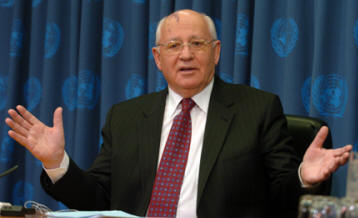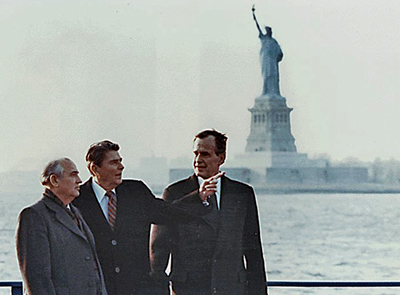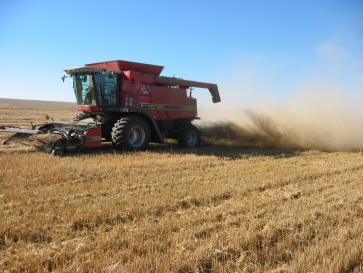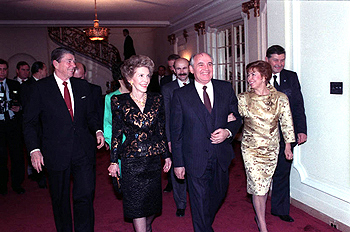|

Mikhail Gorbachev (born 1931)
If you ever need help dismantling communism, Mikhail Sergeyevich
Gorbachev is your man.
Gorbachev was general secretary of the Communist
Party of the Soviet Union from 1985 to 1991 and president of the
Soviet Union from 1990 to 1991.
Gorbachev's
 glasnost politics brought the Soviet Union down on its knees.
He triggered the end of the
glasnost politics brought the Soviet Union down on its knees.
He triggered the end of the
 Cold War
and openly supported the collapse of communism in eastern Europe.
Cold War
and openly supported the collapse of communism in eastern Europe.
By the way,
 what exactly is communism?
what exactly is communism?
On December 7, 1988, Mikhail Gorbachev
delivered a speech before the 43rd session of the United Nations
General Assembly, also called Gorbachev's
 Freedom of Choice speech. Freedom of Choice speech.
After the speech and still in New York,
Gorbachev met with
 Ronald
Reagan and
Ronald
Reagan and
 George H.W. Bush at Governors
Island. Bush commented on Gorbachev's speech:
George H.W. Bush at Governors
Island. Bush commented on Gorbachev's speech:
"His address that day at the UN had
been dramatic in both content and delivery, and it was obvious
he loved the gamesmanship that went with an appearance there. It
was an encouraging speech.
"Gorbachev had said that the threat
or use of force should no longer be an instrument of foreign
policy. He had promised to shift Soviet military doctrine to a
more defensive stance and would unilaterally reduce their armed
forces by 500,000 in two years, which, given their total size,
was small but a good start.
"He also announced that several
armored divisions would be withdrawn from Czechoslovakia,
Hungary, and East Germany by 1991 and disbanded."
And here is the photo:

MIKHAIL GORBACHEV, RONALD
REAGAN, GEORGE BUSH 1988
Non-communist people were delighted and gave Mikhail
Gorbachev the
 Nobel
Prize for Peace. The year? 1990.
Nobel
Prize for Peace. The year? 1990.
On December 10, 1990,
Gorbachev had Andrej Kovaljov read his
 acceptance speech. He did not show up himself because many
of his comrades were furious.
acceptance speech. He did not show up himself because many
of his comrades were furious.
But on June 5, 1991, he did pay the
visit after things had calmed down a bit and finally gave his
 Nobel Lecture.
Nobel Lecture.
Forty years earlier
Mikhail was a cheerful driver in a combine harvester on a communist
farm.
What had changed? Everything.

COMBINE HARVESTER IN ACTION
Gorbachev practiced a policy of openness, Russian:
glasnost,
which meant major economical and political reforms for the country.
Now people were allowed to express their opinions and openly discuss
governmental actions.
It
followed a policy of restructuring, Russian:
 perestroika,
which meant that the time had come for communism to meet democracy
and capitalism.
perestroika,
which meant that the time had come for communism to meet democracy
and capitalism.
In 1987, Mikhail Gorbachev and Ronald Reagan agreed to destroy all intermediate-range nuclear
missiles.
In 1988, Gorbachev pulled Soviet troops out of
Afghanistan.
In 1990, Gorbachev agreed to the
reunification of East with West Germany. The
 Berlin Wall came
down. Berlin Wall came
down.
Go here for Reagan's
 Tear Down This Wall
speech
Tear Down This Wall
speech

OFF TO DINNER:
RONALD, NANCY, MIKHAIL, AND RAISA
WASHINGTON, 1987
Consequently, parts of the Soviet Union were seeking independence.
Avalanche-like, things happened with the quickness. The Soviet Union was
dissolved the same day Mikhail
Gorbachev resigned his presidency.
 Boris Yeltsin kept the candle
lit for Russia.
Boris Yeltsin kept the candle
lit for Russia.
What Is Gorbachev
Doing These Days?
On March 7, 2013, a 82-year-old
Gorbachev told the BBC what he thought of President Vladimir Putin:
The common thread running through all of
them [referring to the number of
controversial laws passed in Russia since
Mr. Putin's return to the presidency] is an
attack on the rights of citizens.
For goodness sake, you shouldn't be afraid
of your own people.
What people want and expect their president
to do is to restore an open, direct dialogue
with them. He shouldn't take offence at
this. He should concentrate on trying to
drag Russia out of the difficult situation
that she is in.
[...]
Putin's entourage is the right one for him.
He selected it and it works the way he wants
it to. Even the inner circle, those by his
side, there are so many thieves and corrupt
officials there.
If things don't change, Russia will continue
to drift like a piece of ice in the Arctic
Ocean.
On March 30, 2013, Gorbachev delivered
a speech at the RIA-Novosti news agency, further pointing out
troubles under Putin's government:
The gap in incomes and living standards
between the small mostly well-to-do stratum
of the population and all the rest is
unacceptably high.
Corruption has acquired a colossal scope.
MIKHAIL
GORBACHEV BRIEF BIOGRAPHY
1931 Birth at Privolye, Stavropol kray, Russia, U.S.S.R.
1946 Joins Young Communist League
1952 Enters Law School at Moscow State University; joins Communist
Party
1953 Marries Raisa Maksimovna Titorenko
1955 Graduates with law degree
1970 First secretary of the regional party committee
1971 Becomes member of Communist Party
1978 Secretary of agriculture of Communist Party
1979 Joins
 Politburo
Politburo
1985 General secretary of the Communist Party
1988 Chairman of the Presidium of the Supreme Soviet
1990 President of the U.S.S.R.
1991, July - Signs
 START
I
START
I
1991, August 19 - 21 - Put under house arrest by old-school communists; back to
president duties right afterwards
1991, December 25 - Resigns as president of the Soviet Union
About Raisa Gorbachev
Raisa was born in Siberia. The year? 1932.
Raisa studied philosophy and became Russia's First lady. Thanks to
Mikhail's glasnost policy Raisa made many public appearances. The
West was delighted, the East not so much.
Raisa died of leukemia in Germany. The year? 1999.
GorbacheV CONTROVERSY
Mikhail Gorbachev might or might not have been involved in the
attempt on the life of
 Pope John
Paul II in 1981. He said he wasn't.
Pope John
Paul II in 1981. He said he wasn't.
In detail:
On May 13, 1981, Mehmet
Ali Agca shot at Pope John Paull II
in St. Peter's Square, Rome. The Pope survived. The Italians
investigated and, in 2006, came to the conclusion that leaders of
the former Soviet Union were behind the assassination attempt, and
that it was blamed on the Bulgarian Secret Police.
(This and more in the book Just 2
Seconds by Gavin de Becker.)
See also
 Assassinations in History
Assassinations in History
And maybe
 American Timeline
American Timeline
More History
|